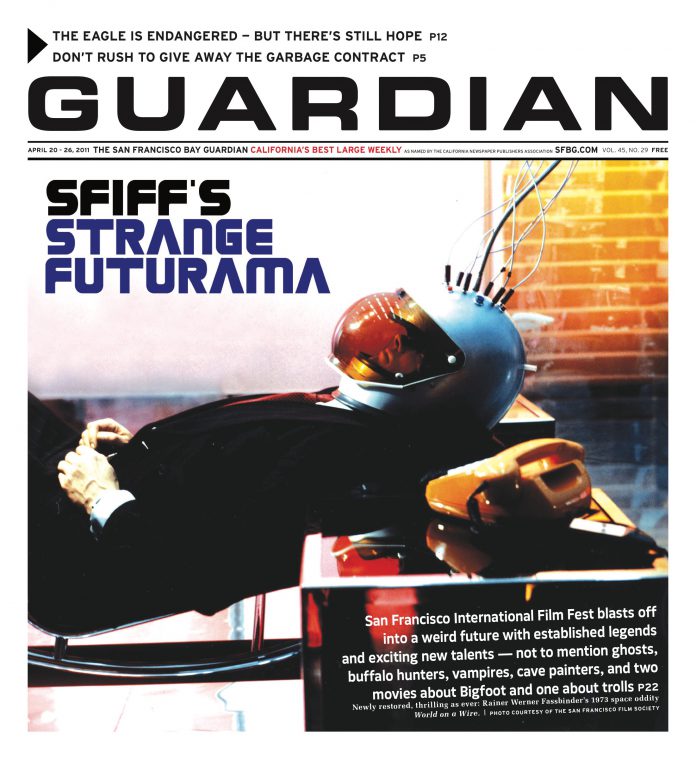arts@sfbg.com
DANCE Is it desirable to invest time and money in an elaborate dance theater piece about a noncontroversial subject? Are we supposed to walk away from an artistic experience having learned something about ourselves that we didn’t know before? Is it worthwhile to make a work about a common or familiar topic? Those are some of the questions that percolated through my mind watching Amara Tabor-Smith’s rich Our Daily Bread, which runs at CounterPULSE through April 24.
The answers, of course, are yes, yes, and yes. Tabor-Smith and her exceptional collaborators, primarily her fellow dancers Stephanie Bastos, Adriel Eddo, Eyle Moore, Aimee Suzara, and Alicia Walters, took on the complex yet basic topic of food — how we choose, prepare, and consume what we put into our mouths — and kneaded it into shapes that proved both muscular and smooth. Laura Diamondstone’s lobby installation and Lauren Elder’s set transformed CounterPULSE into something akin to a home, even including a small arbor with hanging pots of herbs. Ajayi Lumumba Jackson and Guy de Chalus contributed the music.
With the audience being prepped by the smell of cooking wafting through the theater and performers interacting with people as they entered, the experience felt more like visiting somebody’s house instead of a theater. And sure enough, we were offered palate-cleansing ginger, pieces of cake that we fed to a partner, and tiny portions of collard and black-eyed peas. If these gestures proved nothing else, they showed that the way to the heart goes through the stomach. Bread became a love feast.
But Tabor-Smith is too much of an artist to be satisfied with all of us walking out newly determined to become more responsible in our relationship to food. That would have been easy. She did more than that. Bread is a theatrically cogent, emotionally rich piece of dance theater that made us laugh at ourselves and want to scream at the end. The lens she offered is that of African American women as a feisty, independent, cantankerous, and embracing group of human beings. Seeing her dancers teasing and competing in the kitchen — wearing kerchiefs and stirring the pots — and the next moment as fierce warriors with masked faces and shaking fists, raining terror on anybody standing in their way, was transformational. At one point, the women stood huddled in fear back-to-back, reduced to a tiny space, but not giving an inch.
In addition to the dancers, two ancillary figures observed and participated in the work’s trajectory. Elizabeth Summers, an older woman, was the storyteller, the Griot who wandered in and out of the action. A white-clad Pippa Fleming, silently watching from her rocking chair or with her face pressed against the “kitchen” window, acted as an Orisha of death, but perhaps, when sanctifying the dancers at the end, also of hope.
Bread‘s central metaphor of the gumbo — that wondrous stew that would taste so much better without that vile spice called filé — was turned inside out. Women on stage and on video quarreled about the ingredients and you saw it being made. We got to peek into CounterPULSE’s tiny kitchen. But the traditional dish also became a way of honoring the women who made it over the years, and what it represents within individual families. And perhaps even more poignantly, it stood for the tension and love between generations, for a time when eating together created a bond between people like no other. Too bad they couldn’t serve some of it. Without filé please.
In the second half Bread became much darker as it focused more tightly on the exploitative farming practices that prevent communities with little economic power from accessing wholesome food and allow middle-class Americans to spend less of their food budget. An old news clip described “hard-working” braceros working in the fields. The reporter was so condescending in the way he described the “efficiency” of these farming practices, you wanted to scream. The choreographic response paid tribute to the workers’ physical gestures.
In the beginning, Bread meandered. Its ending — a memorial service honoring a Latino teenager who died of heat exhaustion because of no access to water — came at you with the force of a divine revenge. Imagine a wake in which weeping turns into screaming whose fury quite possibly might awaken the dead.
OUR DAILY BREAD
Thurs/21–Sun/24, 8 p.m.; $15–$22
CounterPULSE
1310 Mission, SF
(415) 626-2060

